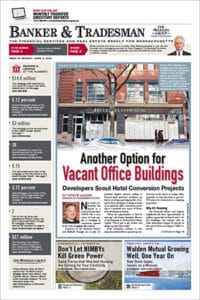You might not make an immediate mental connection between hunter-gatherer societies and the ascent of shared office space, but those were the sort of comparisons being tossed around District Hall in Boston’s Seaport District as tech leaders gathered Thursday.
Elie Finegold, a senior VP at CBRE, expanded on the “Disrupt CRE” theme of the conference by commenting that the way people use real estate is being transformed by the start-up revolution and the growing popularity of shared office space environments. That has fundamentally changed the relationship between landlords and tenants, Finegold said.
Such changes have occurred only a few times in history, Finegold said, mentioning the transitions from hunter-gatherer society to farming and the industrial revolution.
Most recently, the start-up business model has forced office landlords to offer more flexible terms to companies that need to grow quickly but have little long-term financial security.
“You had knowledge workers chained to filing cabinets and typewriters and now we are unchained. There is more space for transformation there has been before,” Finegold said. “It’s still early days, but it’s interesting.”
Alex Newmann is vice president of sales at Pivotdesk, an online network that matches start-ups looking for short-term office desk rentals with companies that have excess space.
“The real estate world is traditionally an archaic world, where things are protected through leases and landlords and huge parent companies,” Newmann said. “As entrepreneurship is growing, they have no idea how big they’re going to be in six months, let alone six years. It’s making everything more efficient.”
WiredScore, a New York-based company that rates commercial properties based on Internet access, is expanding into the Boston market. WiredScore partners with landlords and property managers to rate office buildings on such criteria as how many carriers they offer, quality of connectivity and how accessible Internet connections are, CEO Arie Barendrecht announced via a fiber-optic feed from New York.
“We’ve heard way too many horror stories of companies who realize after moving that their Internet connectivity is unworkable,” he said.
Before you get the impression that tech is biased in favor of tenants, Brandon Weber of New York’s Hightower spoke about how landlords can harness data to market properties more efficiently.
Weber, a former broker at CBRE, talked about how Hightower’s platform aggregates details such as the average number of days from tours to an executed lease.
“I was in the business. None of us knew the answers to these questions,” Weber said.
Jeffrey Finn, CEO of real estate data provider RealNex, expanded on the topic of collaboration making real estate markets more efficient. An industry that was traditionally local and informal has become more collaborative, with a “Lone Ranger approach” and country-club friendships replaced by data-driven boardroom decisions.
“It’s up to the brokers to take a leadership role and adapt to the transformation before it is disrupted and we’re put out of business,” Finn said.
-STEVE ADAMS







